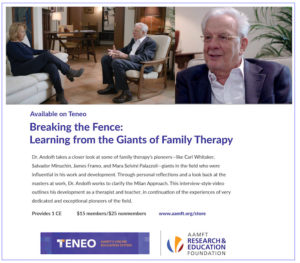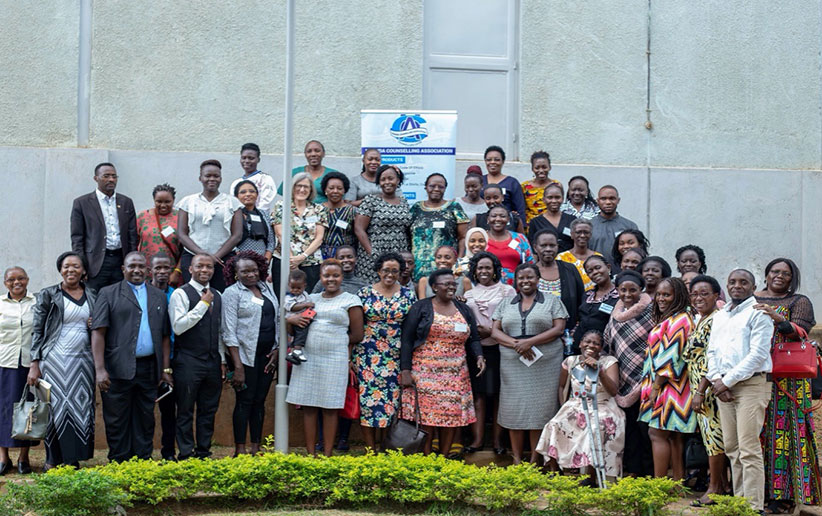
This issue of FTM is quite personal for me as both a Latinx female and the child of immigrants. The articles written for and selected for this issue reflect how first, second, third and beyond generations of children, adolescents, and young adults have evolved through the process of acculturation—a quest for belongingness in a new culture, along with the “fight” to retain one’s “home” customs, traditions, values and oftentimes language. This is not unique of course to individuals of Hispanic heritage, and some of the dynamics can certainly be applied to a broad range of diversity and the immigrant experience from any country (although there can clearly exist differences depending on the cause of immigration such as political persecution, war, threat of violence, loss of freedoms, economic deprivation, etc). Indeed, one of the first things I learned about systemic therapy when I started my educational journey about 35 years ago, was that it was by definition culturally sensitive because it is focused on process, and not on content (reducing the tendency to focus on culture as a content to be “treated” or assimilated when problems arose in the process of acculturation in the family’s developmental stages).
I studied and worked at the University of Miami’s Department of Psychiatry, which housed the Spanish Family Guidance Center, created in the mid 1970s, to study and treat the growing epidemic of adolescent substance disorders amongst Hispanic youth, first-generation children of mostly Cuban immigrants/refugees. Like myself, most of my colleagues had come as minors from Cuba, or were born shortly after exile—so we were “subject matter experts” as well. My mentor, Olga Hervis, the co-developer of Brief Strategic Family Therapy (BSFT®; developed at the University of Miami), has told the story over and over again that the grant they had received from NIMH funded the team there to go “therapy shopping” to develop a model that would be both culturally sensitive and effective to treat Hispanic youth. She and her colleague and co-developer of BSFT®, Dr. Jose Szapocznik, and their Director, Dr. Mercedes Scopetta, ended up at the Philadelphia Child Guidance Center with Salvador Minuchin and Jay Haley. A perfect cultural fit was found with a family systems approach in the assessment and treatment of the identified patient suffering from symptoms of internalizing and/or externalizing disorders. This prompted a flurry of further funding and research which resulted in several works aimed at the growing population in South Florida of Hispanic immigrants/refugees from all over the Caribbean, Central and South America: Bicultural Effectiveness Training (BET; 1986); Family Effectiveness Training (FET; 1989); and ultimately BSFT® (2020).
As a fellow Latinx MFT and President of the AAMFT Board of Directors, it is indeed a privilege to introduce and highlight the authors and titles of the articles in this issue of FTM:
- From Adversity to Empowerment: Using Ancestral Stories to Guide Latinx Therapy
This article illustrates the use of Narrative Therapy in working with a client from Colombia who had difficulty adjusting after immigration, by Julian Crespo, PhD and Carlos Ramos, PhD - Supporting Daughters of Latin American Immigrants Navigating Higher Education
This article highlights Latina daughters of immigrants who seek higher education and are torn between duties to family and expectations from parents to pursue higher education, by Jaqueline Florian MA - Beyond Our Struggles: Addressing Stereotypes in Latinx Families
This article addresses stereotypes about Latinx families, by Sandra Espinoza, PsyD, and Mandee Duran, BA
Though each have a different focus, all describe culturally appropriate systemic interventions that honor the traditions, values, and strengths of their cultures of origin. It is important to note, as some of the article titles allude to, that there are vast cultural differences amongst the Latinx population. Even within the same country, socioeconomic and racial differences can produce very different experiences for individuals and families that make it impossible and inadvisable to generalize cultural information to all the Latinx people in that country. Yet, there are a few repetitive patterns of interactions that have emerged consistently in the work conducted over the years (developed at the University of Miami referenced above) and in my experience with Latinx families:
• A tendency towards enmeshed boundaries and forms of communication
• Parentification of children
• Reliance on a strong hierarchical family structure (where the male is the head of the household)
Rather than view these as dysfunctional or pathological in essence, it is important for a culturally sensitive systemic practitioner to assess the functionality of that relational pattern as it relates to the presenting problem—as it may either work very well for that particular family, and not be directly related to the presenting problem (a family strength even)—or conversely, the interactional pattern or structure has become too rigid, not allowing enough flexibility for growth for the family members and as a whole. The stress of immigration and acculturation can induce this rigidity as families consciously and unconsciously strive to maintain homeostasis of their culture of origin. For example, in the list above, the last two patterns of interactions give rise to conflict and negativity in the family when children, by virtue of acculturating faster (mastering the language/norms more quickly and increased responsibility in the home), challenge the parental authority (hierarchy). A culturally aware and systemically trained practitioner will use process observations and circular questioning to respectfully choose relational interventions that re-direct more functional behaviors while preserving cultural relational tendencies and values. The articles in this issue all reflect this common theme of utilizing culture as a strength in the therapeutic process.
I want to thank all the authors of the articles submitted for this issue on the Latinx family for their work and dedication to this rapidly growing population in the United States; and acknowledge AAMFT members, leaders, and staff for their commitment to Diversity, Equity, and Inclusivity in the Association.
References
Szapocznik, J., Rio, A., Perez-Vidal, A., Kurtunes, W., Hervis, O., & Santisteban, D. (1986). Bicultural Effectiveness Training (BET): An experimental test of an intervention modality for families experiencing intergenerational/intercultural conflict. Hispanic Journal of Behavioral Sciences, 8, 303-330. http://dx.doi.org/10.1177/07399863860084001
Szapocznik, J., Santisteban, D., Rio, A., Perez-Vidal, A., Santisteban, D., & Kurtines, W.M. (1989). Family Effectiveness Training: An intervention to prevent drug abuse and problem behaviors in Hispanic adolescents. Hispanic Journal of Behavioral Sciences, 11, 4-27. http://dx.doi.org/10.1177/07399863890111002
Szapocznik, J., & Hervis, O. (2020). Brief Strategic Family Therapy. Washington, D.C.: American Psychological Association (APA).



